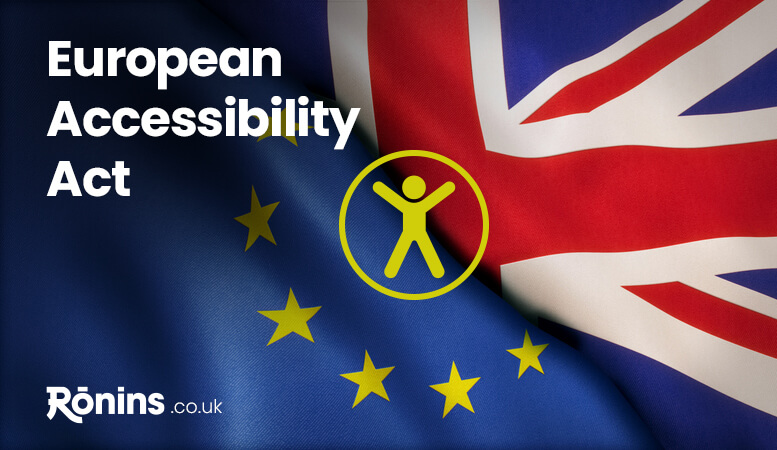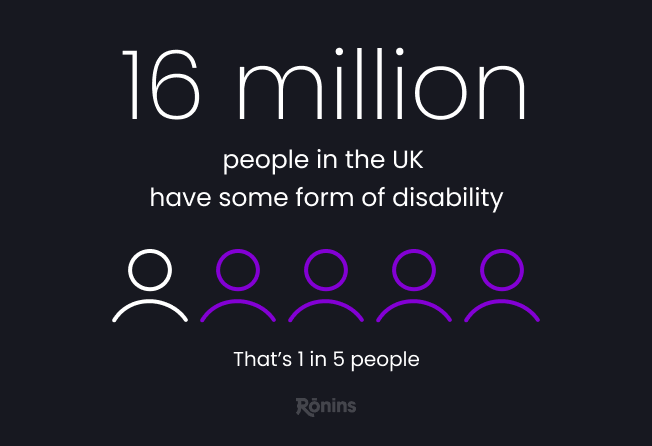
European Accessibility Act 2025: What UK Businesses Need to Know Now
Table of Contents
TLDR
The European Accessibility Act takes effect June 28, 2025 – requiring digital services in the EU to meet WCAG 2.1 AA accessibility standards.
While not directly applicable to UK-only businesses post-Brexit, the EAA affects any UK company selling to EU customers. Even without legal imperitive, implementing accessibility best practices delivers substantial benefits: protecting against Equality Act claims, reaching 16 million potential UK customers with disabilities, improving SEO performance, and gaining competitive advantage.
Forward-thinking businesses are treating accessibility as both a moral necessity and smart business strategy, with implementation deadlines approaching quickly. Don’t wait for accessibility regulations to catch up – the time to act is now.
Introduction
With at least one in five people in the UK having a long-term illness, impairment, or disability, accessibility is not just a legal consideration but a crucial business imperative. Digital accessibility ensures that websites, mobile apps and online services can be used by everyone, regardless of their abilities or disabilities.
The landscape of accessibility requirements is evolving rapidly. While the UK has established accessibility regulations for public sector organisations, private sector requirements have traditionally been less stringent. However, with the introduction of the European Accessibility Act (EAA), businesses that operate across UK and EU markets now face new considerations that may signal the direction of future UK accessibility regulations.
This article explains the current state of digital accessibility requirements, what UK businesses need to know about the European Accessibility Act, and how organisations can prepare for an increasingly accessible digital future.

Understanding Digital Accessibility
Digital accessibility refers to the practice of designing and developing websites, mobile apps, applications and electronic documents so they can be used by people with various disabilities, including:
- Visual impairments (blindness, low vision, colour blindness)
- Hearing impairments (deafness, hard of hearing)
- Motor disabilities (limited fine motor control, paralysis)
- Cognitive and learning disabilities (dyslexia, attention deficit disorders)
Accessible digital experiences follow established standards that ensure digital content is:
- Perceivable: Information must be presented in ways all users can perceive, such as providing text alternatives for images and captions for videos.
- Operable: User interface components must be navigable and usable by everyone, including those using keyboards instead of mice.
- Understandable: Information and interface operation must be clear and consistent.
- Robust: Digital content must be compatible with various assistive technologies and remain accessible as technologies evolve.
These principles form the foundation of the Web Content Accessibility Guidelines (WCAG), the internationally recognised standard for digital accessibility.
• • •
What is the European Accessibility Act (EAA)?
The European Accessibility Act is an EU directive establishing common accessibility requirements for certain digital products and services. It aims to improve the functioning of the internal market by removing barriers created by divergent rules across EU member states.
Key Features of the EAA
- Scope: The EAA covers websites, mobile applications, e-books, e-commerce, banking services, transport services, and consumer hardware such as tv equipment, computers, smartphones, and operating systems.
- Standards: It requires conformance with WCAG 2.1 AA criteria, which include specific technical requirements for accessibility.
- Implementation Timeline: The EAA becomes legally applicable in European Union member states from June 28, 2025, with different sectors having staggered accessibility compliance deadlines:
- Public sector websites and mobile apps: By 2027
- Private service providers: By 2028
- Microenterprises providing services: By 2029
- Penalties: Non-compliance could result in fines of up to €20 million or 4% of global annual turnover.
Who Must Comply with the EAA?
The EAA primarily applies to:
- Businesses that develop, sell, or provide digital products and services in EU countries
- Companies with more than 10 employees or annual turnover exceeding €2 million
- Smaller businesses that supply digital services to larger EU-operating companies
Importantly for UK businesses, the EAA applies to any company offering products or services to EU consumers, regardless of where the company is based. This means UK businesses serving EU markets must comply with the EAA despite Brexit.
• • •
The UK’s Position Post-Brexit
Following Brexit, the UK is not obligated to adopt the European Accessibility Act into domestic law. This creates a divergence in requirements depending on a business’s market focus:
For UK Businesses Operating Solely in the UK
The primary legislation governing accessibility in the UK remains the Equality Act 2010, which requires service providers to make “reasonable adjustments” for disabled users. While this creates a legal obligation to ensure accessibility, it does not prescribe specific technical standards.
For the public sector, the Public Sector Bodies (Websites and Mobile Applications) Accessibility Regulations 2018 mandate compliance with WCAG 2.1 AA standards. However, no equivalent legislation currently exists for private sector organisations.
For UK Businesses Operating in the EU
UK companies that offer products or services to European Union consumers must comply with the EAA by the relevant deadlines, regardless of Brexit. This includes:
- E-commerce platforms selling to EU customers
- Digital service providers with EU users
- Hardware and software developers marketing products in the EU
- Financial and transport services operating in EU territories
This dual standard creates a situation where many UK businesses will need to meet the more stringent EAA requirements for their EU operations while potentially maintaining different standards for UK-only services.
• • •

Why All UK Businesses Should Prioritise Accessibility
Even for companies operating exclusively within the UK, there are compelling reasons to adopt EAA-level accessibility standards:
1. Legal Risk Mitigation
While the Equality Act 2010 doesn’t specify technical standards, UK courts increasingly look to established guidelines like WCAG when determining whether “reasonable adjustments” have been made. Companies with inaccessible websites risk legal action, with several high-profile cases of non-compliance already setting precedents in this area.
2. Market Opportunity
Approximately 16 million disabled people live in the UK, representing a significant consumer base. Inaccessible websites and mobile apps effectively exclude these potential customers by denying them equal access to digital content. Studies show that 71% of disabled people will leave a website that is difficult to use, taking their business elsewhere to accessible alternatives.
3. Search Engine Optimisation Benefits
Many accessibility improvements align with search engine optimisation best practices. Proper heading structures, descriptive alt text, keyboard navigation, and clear site organisation help search engines better understand and rank content, resulting in improved visibility.
4. Future-Proofing
The UK government may eventually introduce web accessibility legislation similar to the EAA for domestic markets. Companies that proactively adopt website accessibility standards will be better positioned when new accessibility regulations emerge.
5. Brand Reputation and Competitive Advantage
Organisations that demonstrate commitment to inclusivity often enjoy enhanced brand perception and loyalty, with accessibility standards increasingly becoming a key success criterion in corporate social responsibility (CSR) strategies, particularly for consumer-facing businesses.
• • •
Common Accessibility Barriers and Solutions
Understanding typical website accessibility issues can help organisations identify and address challenges on their digital platforms:
Visual Accessibility
Common barriers:
- Images without alternative text
- Poor colour contrast
- Text that cannot be resized
- PDF documents that are not properly tagged
Solutions:
- Add descriptive alt text to all images
- Ensure a minimum contrast ratio of 4.5:1 for normal text
- Design layouts that accommodate text enlargement up to 200%
- Create PDFs with proper tags and reading order
Keyboard Accessibility
Common barriers:
- Functions that require mouse interaction
- Missing focus indicators
- Keyboard traps in complex components
Solutions:
- Ensure all interactive elements are keyboard operable
- Provide visible focus states for interactive elements
- Test navigation with keyboard-only users in mind
Screen Reader Compatibility
Common barriers:
- Form fields without proper labels
- Complex tables without appropriate markup
- Dynamic content that doesn’t announce changes
Solutions:
- Associate labels with form controls
- Use table headers and appropriate markup
- Implement ARIA (Accessible Rich Internet Applications) attributes for dynamic content
Cognitive Accessibility
Common barriers:
- Inconsistent navigation
- Complex language
- Time-limited content
- Flashing or distracting elements
Solutions:
- Create predictable navigation patterns
- Use clear, simple language
- Allow users to control timing
- Avoid digital content that flashes more than three times per second
• • •
Steps to Improve Digital Accessibility
Whether preparing for EAA compliance or enhancing accessibility for UK users, organisations should consider the following approach to improve accessibility issues and enhance user experience:
1. Conduct Accessibility Audits
Begin with a comprehensive assessment of your digital properties:
- Automated testing tools can identify many technical issues
- Manual expert review will catch problems automation might miss
- User testing with people who have disabilities provides invaluable insight
2. Develop an Accessibility Roadmap
Based on accessibility audit findings:
- Prioritise critical issues that prevent access
- Create a phased approach to address all identified barriers
- Establish timelines aligned with EAA implementation deadlines if applicable
3. Implement Accessibility Governance
Sustainable accessibility requires organisational commitment:
- Establish clear accessibility policies
- Assign responsibility for ongoing compliance
- Provide accessibility training to development and content teams on WCAG accessibility best practices
- Integrate accessibility testing into product development cycles
4. Create an Accessibility Statement
Transparency about your accessibility efforts builds trust:
- Document the accessibility standards you follow
- Acknowledge known limitations
- Provide alternative means of access where necessary
- Include contact information for accessibility feedback
5. Monitor and Maintain Accessibility
Accessibility is an ongoing process:
- Regularly test digital properties for regression
- Stay informed about evolving standards and requirements
- Collect and respond to user feedback about accessibility challenges
The UK’s Path Forward
While the UK government has not announced plans to create direct EAA equivalents for domestic markets, the direction of travel suggests increasing focus on digital inclusion. The recent National Disability Strategy acknowledges the importance of digital accessibility, and public sector requirements demonstrate government recognition of accessibility as a priority.
Forward-thinking UK businesses are using this moment of regulatory divergence as an opportunity to gain competitive advantage. By implementing comprehensive accessibility practices now, they not only prepare for potential future digital accessibility laws but also immediately expand their reach to millions of users with disabilities.
• • •
Conclusion
The European Accessibility Act represents a significant step toward more inclusive digital experiences across Europe. Compliance is not optional for UK businesses serving EU markets. For those focused on domestic operations, the business case for accessibility remains compelling even without explicit regulatory requirements.
At Ronins, we believe digital accessibility is not just a commercial advantage or legal obligation. Digital inclusion is a moral obligation to provide equal access to digital content.
Following WCAG 2.1 AA guidelines isn’t something we treat as an afterthought or add-on—it’s baked into our web design and mobile app design and development processes from the very beginning and forms part of our success criteria. This commitment ensures that every website we create is accessible to as many users as possible, regardless of their abilities or disabilities.
Digital accessibility is not merely about compliance—it’s about creating inclusive experiences that reach the widest possible audience. Organisations that prioritise accessible websites and mobile applications today will build stronger brands, reach more customers and be better positioned for success in an increasingly regulated future.
By taking proactive steps toward comprehensive digital accessibility, UK businesses can remain competitive in both UK and EU markets while fulfilling their responsibility to create a more inclusive digital world.





